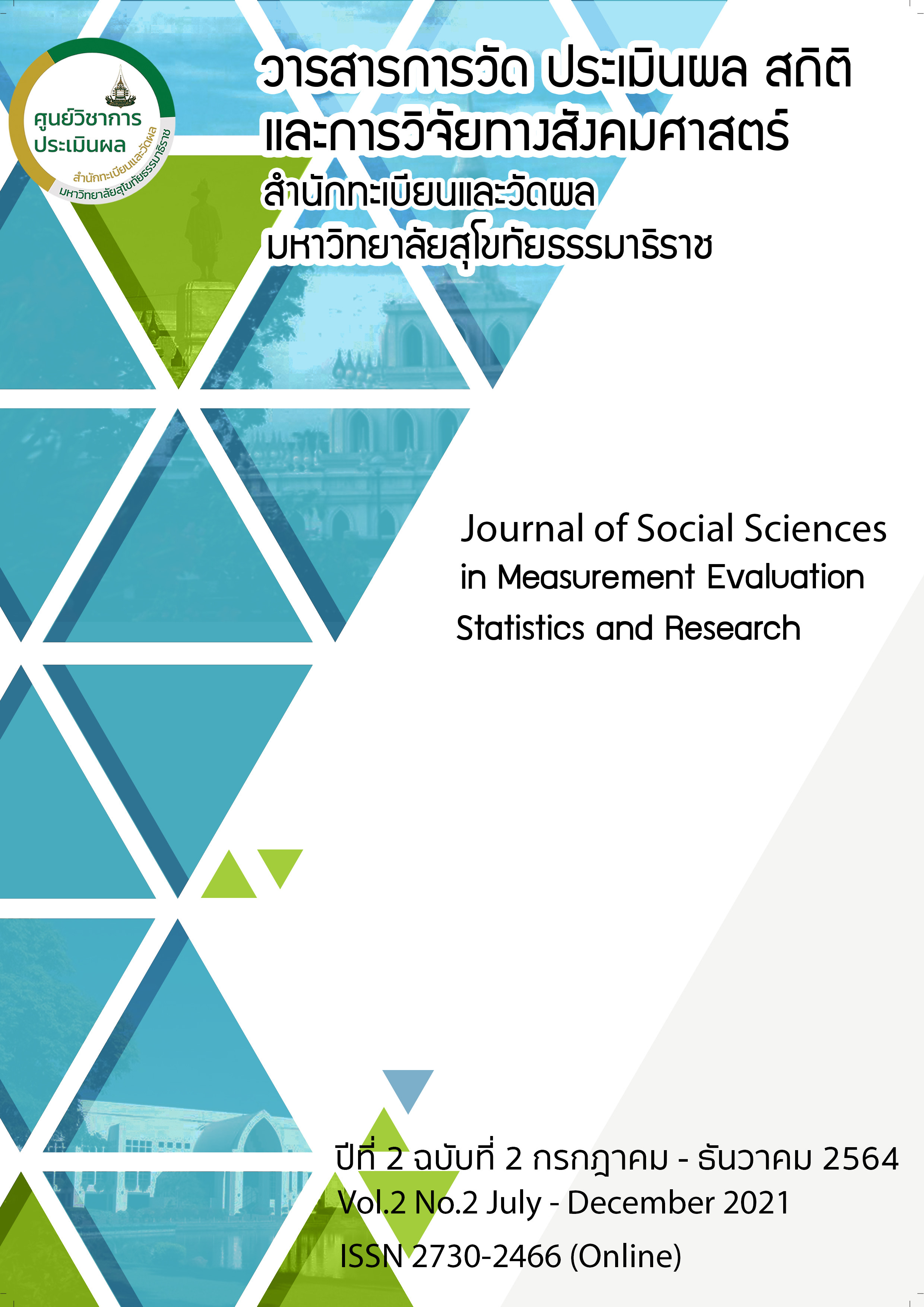สมรรถนะการสอนออนไลน์ของครู: มุมมองความท้าทายในสถานการณ์การแพร่ระบาดของโรคติดเชื้อไวรัสโคโรนา 2019
Main Article Content
บทคัดย่อ
บทความนี้มุ่งนำเสนอความหมายของคำว่าสมรรถนะ แนวคิดเกี่ยวกับสมรรถนะการสอนออนไลน์ตามกรอบของทีแพคเอส ที่ประกอบด้วย 15 องค์ประกอบ คือ 1) ความรู้ด้านเทคโนโลยี 2) ความรู้ด้านวิชาครู 3) ความรู้ด้านเนื้อหา 4) ความรู้ด้านเทคโนโลยีบูรณาการกับความรู้ด้านวิชาครู 5) ความรู้ด้านนักเรียน 6) ความรู้ด้านเทคโนโลยีบูรณาการกับความรู้ด้านเนื้อหา 7) ความรู้ด้านวิชาครูบูรณาการกับความรู้ด้านเนื้อหา 8) ความรู้ด้านเทคโนโลยีบูรณาการกับความรู้ด้านวิชาครูบูรณาการกับความรู้ด้านเนื้อหา 9) ความรู้ด้านเนื้อหาที่เหมาะกับนักเรียน 10) ความรู้ด้านวิชาครูที่เหมาะกับนักเรียน 11) ความรู้ด้านเทคโนโลยีที่เหมาะกับนักเรียน 12) ความรู้ด้านวิชาครู เนื้อหาที่เหมาะกับนักเรียน 13) ความรู้ด้านเทคโนโลยี เนื้อหาที่เหมาะกับนักเรียน 14) ความรู้ด้านเทคโนโลยี วิชาครูที่เหมาะกับนักเรียน และ 15) ความรู้ด้านเทคโนโลยี วิชาครูและเนื้อหาที่เหมาะกับนักเรียน และประเด็นความท้าทายต่าง ๆ ที่ครูต้องเผชิญเกี่ยวกับการสอนออนไลน์ในช่วงที่มีสถานการณ์การแพร่ระบาดของของโรคติดเชื้อไวรัสโคโรนา 2019
Article Details
ข้อความและบทความในวารสารการวัด ประเมินผล สถิติ และการวิจัยทางสังคมศาสตร์ เป็นแนวคิดของผู้เขียน มิใช่ความคิดเห็นของกองบรรณาธิการวารสาร จึงมิใช่ความรับผิดชอบของวารสารการวัด ประเมินผล สถิติ และการวิจัยทางสังคมศาสตร์ บทความในวารสารต้องไม่เคยตีพิมพ์ที่ใดมาก่อน และสงวนสิทธิ์ตามกฎหมายไทย การจะนำไปเผยแพร่ ต้องได้รับอนุญาตเป็นลายลักษณ์อักษรจากกองบรรณาธิการ
เอกสารอ้างอิง
ปราวีณยา สุวรรณณัฐโชติ. (2561). สมรรถนะและบทบาทผู้สอนออนไลน์ : การแสดงตนและการสนับสนุนผู้เรียน. วารสารบัณฑิตศึกษา มหาวิทยาลัยราชภัฏวไลยอลงกรณ์ ในพระบรมราชูปถัมภ์, 17(2), 244-256.
พจนานุกรมฉบับราชบัณฑิตยสถาน พ.ศ. 2554. (2554). ระบบค้นหาคำศัพท์. สืบค้น 14 กรกฎาคม 2564, จาก https://dictionary.orst.go.th/
วรงค์ศรี แสงบรรจง. (2555). เครื่องมือและโมเดลการวัดทีแพค-เอสของนิสิตนักศึกษาครู : การพัฒนาและ วิเคราะห์เปรียบเทียบโมเดลแข่งขัน. (ดุษฎีบัณฑิต), จุฬาลงกรณ์มหาวิทยาลัย, กรุงเทพมหานคร.
ศุภมาส ชุมแก้ว และปัญญา ธีระวิทยเลิศ. (2564). สมรรถนะด้านการวัดและประเมินผลของครูยุคใหม่. คุรุสภาวิทยาจารย์, 2(2), 1-15.
ศุภมาส ชุมแก้ว. (2558). อิทธิพลเชิงสาเหตุการรู้เรื่องการประเมินของครู: การวิเคราะห์โมเดลสมการโครงสร้างพหุระดับที่มีสมรรถนะการประเมินของผู้บริหารเป็นตัวแปร. (ดุษฎีบัณฑิต), จุฬาลงกรณ์มหาวิทยาลัย, กรุงเทพมหานคร.
สำนักงานคณะกรรมการข้าราชการพลเรือน. (2548). สมรรถนะของข้าราชการพลเรือนไทย. กรุงเทพมหานคร: พี. เอ. ลิฟวิ่ง.
สำนักงานเลขาธิการสภาการศึกษา. (2562). เข้าใจสมรรถนะอย่างง่าย ๆ ฉบับประชาชน และเข้าใจหลักสูตรฐานสมรรถนะอย่างง่ายๆ ฉบับครู ผู้บริหาร และบุคลากรทางการศึกษา. กรุงเทพฯ: 21 เซ็นจูรี่.
สุวิมล ว่องวาณิช. (2556). แนวคิดการปฏิบัติงานของครู. ใน สุวิมล ว่องวาณิช และคณะ (2556, 9-24) คู่มือปฏิบัติการครูในการประเมินสู่การเรียนการสอน สำนักงานสนับสนุนการวิจัย (สกว.). กรุงเทพมหานคร: บริษัทพริกหวานกราฟฟิค จำกัด.
Abdous, M. H. (2011). A process-oriented framework for acquiring online teaching competencies. Journal of Computing in Higher Education, 23(1), 60-77.
Bento, F., & Couto, K. C. (2021). A behavioral perspective on community resilience during the COVID-19 pandemic: The case of Paraisópolis in São Paulo, Brazil. Sustainability, 13(3), 1447.
Black, P., & William, D. (1998). Inside the black box: Raising standards through classroom assessment. Phi Delta Kappan, 8(2), 139-148.
Codina, N., Castillo, I., Pestana, J. V., & Balaguer, I. (2020). Preventing procrastination behaviours: teaching styles and competence in university students. Sustainability,
12(6), 2448.
Grant, A. C. (2010). Tearing down the walls: creating global classrooms through online teacher preparation programs. Distance Learning, 7(2), 37.
Kim, J. (2020). Learning and teaching online during Covid-19: Experiences of student teachers in an early childhood education practicum. International Journal of Early Childhood, 52(2), 145-158.
Koehler, M., & Mishra, P. (2009). Using the TPACK Image. Retrieved October 29, 2021, from http://www.tpack.org/
Koehler, M., & Mishra, P. (2009). What is technological pedagogical content knowledge (TPACK)?. Contemporary Issues in Technology and Teacher Education, 9(1), 60-70.
McClelland, D. C. (1973). Testing for competence rather than for" intelligence.". American psychologist, 28(1), 1.
Mertler, C. A. (2009). Teachers' assessment knowledge and their perceptions of the impact of classroom assessment professional development. Improving Schools, 12(2), 101-113.
Mifflin Harcourt. (2020). American heritage dictionary of the English language. Retrieved October 29, 2021, from https://www.ahdictionary.com/
Mishra, P., & Koehler, M. J. (2006). Technological pedagogical content knowledge: A framework for teacher knowledge. Teachers College Record, 108(6), 1017-1054.
Ouyang, F., & Scharber, C. (2017). The influences of an experienced instructor's discussion design and facilitation on an online learning community development: A social network analysis study. The Internet and Higher Education, 35, 34-47.
Oxford University. (2021). Oxford learner’s dictionaries. Retrieved October 29, 2021 from https://www.oxfordlearnersdictionaries.com/
Raman, R., Sairam, B., Veena, G., Vachharajani, H., & Nedungadi, P. (2021). Adoption of online proctored examinations by university students during COVID-19: Innovation diffusion study. Education and Information Technologies, 1-20.
Redecker, C. (2017). European Framework for the Digital Competence of Educators: DigCompEdu. In Y. Punie (Ed.), Joint Research Centre (JRC) Science for Policy report. Publications Office of the European Union. https://doi.org/10.2760/159770
Santos, C., Pedro, N., & Mattar, J. (2021). Digital competence of higher education professors. Obra Digital, (21), 69-92.
Scarino, A. (2013). Language assessment literacy as self-awareness: Understanding the role of interpretation in assessment and in teacher learning. Language Testing, 30(3), 309-327.
Shulman, L. S. (1986). Paradigms and Research Programs in the Study of Teaching: A Contemporary Perspective. Retrieved October 27, 2021, from https://blogs.edbutexas.edu/mmosley/files/ 2010/02/I.-Paradigms-and-Research-Programs.pdf.
Tuyela, L. G. (Ed.). (2007). Thesaurus of psychological index terms (11th ed.). American Psychological Association.
Wilson, M. (2005). Constructing measures: an item response modeling approach. Mahwah, NJ: Lawrence Erlbaum. Retrieved from https://doi.org/10.4324/9781410611697EDUCA Online Festival


